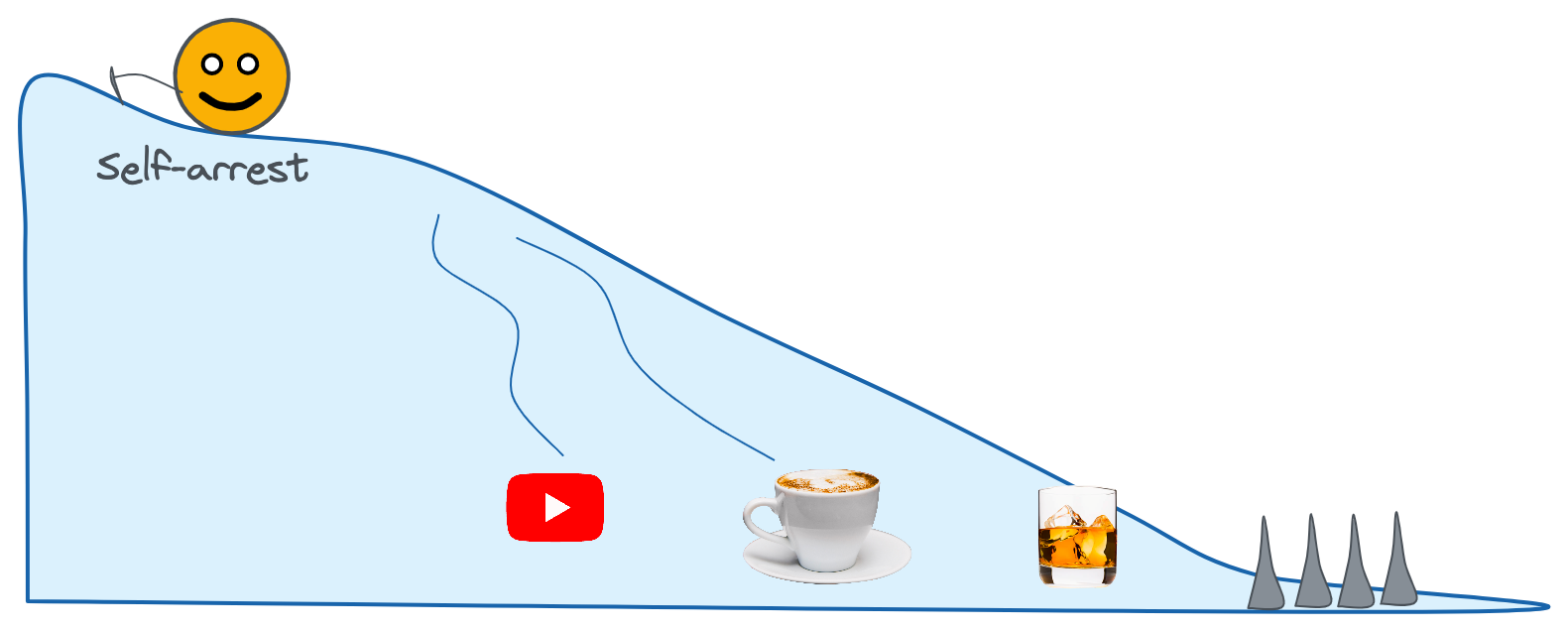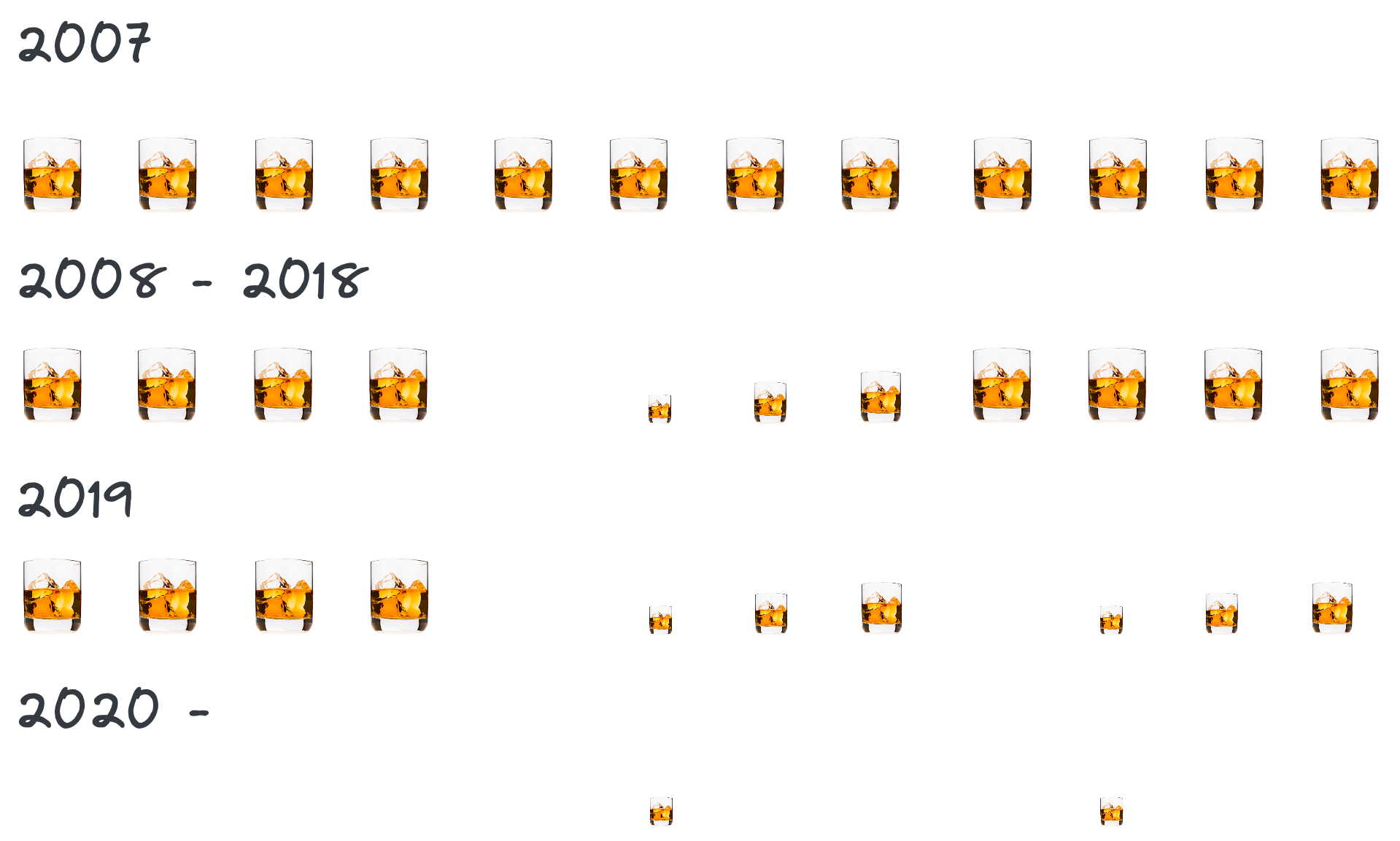…distraction is just another way our brains attempt to deal with pain.
- Nir Eyal, Indistractable
Welcome to part 9 of the series on “How to be a game changer”. You can find the previous posts here 1, 2, 3, 4, 5, 6, 7, 8.
There are games which can be win-win when played a limited amount, but become overall negative if you play them excessively. For example, unhealthy addictions can feel like a slippery slope - starting with a little bit, and then becoming a regular user, who is more and more attracted to the game. With such slippery slope games, one way to opt out is to define and maintain a stopping point - a.k.a. Shelling - a point beyond which we don’t venture, as the slope is too slippery for us, and we’re going to slide away. I highly recommend reading this article from Less Wrong, as my article largely applies its ideas, and illustrates them with stories from my life. I will share two stories of slippery slope games - substances and entertainment.
Defining the point a-priori allows us to self-arrest the way a mountaineer would be able to stop themselves from falling on an actual icy slippery slope.

Addictive Substances
I used to drink a lot, but today I don’t. Here’s what happened. I think Alcohol can be a very effective way to quickly relax after a stressful day, and in the right social environment, can help people who drink it to open up to social connections, be more empathetic, and foster relationships. I used to drink regularly, and I found it hard to control how much I drank. When I was buzzed, I wanted to drink more and more.
Fifteen years ago, when I was in college I used to drink a lot. I enjoyed and craved drinking. But one day, someone close called me an alcoholic. I didn’t identify as alcoholic and this criticism made me feel painful, and in doubt of myself. After another binge, and a really bad hangover the next day, I decided to take a break from alcohol, and didn’t drink for a month. I wrote more about the story here. I kept the practice of no-alcohol month every year for 12 years, and I gradually started noticing that after an alcohol fast, I would start back drinking slowly, one drink a week or so, but gradually the volume would increase. It’s a slippery slope! Few years ago I started adding a second month of no alcohol, which lead to adding a third month the year after, which easily transformed to my current relationship to alcohol. Today, I’d only have a drink on a special occasion, and I’m in a near permanent alcohol fast.
For me, the Shelling point of alcohol has moved very close to the no-alcohol zone, and I think of my relationship to alcohol as healthy at that level. Some people can maintain a personal restriction of never going more than 1-2 drinks per night, and that can also be a sustainable relationship to it. People who are past alcoholics, or others who just went cold turkey are staying at completely zero alcohol in their life. That’s where they put their boundary and it’s OK. They stay in self-arrest all of the time, as they wouldn’t be able to stop if they slide even a little bit. If I didn’t take 10 years to gradually wean off it my boundary would be different. I think I can self-arrest if I notice myself sliding, so I allow myself a drink on special occasions.

Other substances may be more addictive than alcohol. I’ve never had heroin, which is known to be extremely addictive, and I cannot speak about it. But I’ve had another extremely addictive drug, which 90% of US population is currently addicted to - caffeine. It started with black tea, and in college I upgraded to coffee. Caffeine is a reasonably healthy drug, unlike alcohol which is toxic. Caffeine can also boost mental focus for brief periods, and a lot of our economy runs on coffee and tea, perhaps as much as it runs on gasoline.
For me, caffeine’s addiction slope was less slippery than alcohol - I could easily maintain a certain amount of coffee per day for a long time, without needing to increase - it felt more like a staircase, than slope. The reason I decided to opt-out of caffeine is that I thought was abusing it to force myself to do work I didn’t actually want to do. I also had the hypothesis that the human body should be fine without it, as we’ve had most of our biological evolution without it. A wolf doesn’t drink an espresso before chasing a deer, after all. I didn’t find good long term research on caffeine addiction - it is hard to find subjects for a control study when nearly everyone uses, and who the hell wants to give up coffee and suffer. Whatever research I found seemed to only focus on short term, and I was curious about the long term effects of caffeine.
So, on March 14th 2018 (pi day!), after weaning out caffeine for a few weeks, I quit it. The self-arrest shook me up, and caffeine withdrawal felt much worse than alcohol withdrawal. For a few weeks, I had headaches, exhaustion and other withdrawal symptoms. I was between jobs, and I had the privilege to afford the space for the withdrawal, and to realize that I can be productive without caffeine, perhaps even more productive over the long term. Since then, I’ve learned to recognize how music, exercise, cold showers and pomodoro timers can induce the same level of focus. And I’ve learned to appreciate how I can be more motivated by having skin in the game.
Today, I will only have caffeine in “emergency” or if I am climbing a high elevation. I also occasionally have small amounts of dark chocolate, which has caffeine too. My Shelling point is very close to zero, and honestly, caffeine doesn’t feel that good to me any more, after the first few minutes of focus. I feel grateful for having reduced my dependency on it.
Information slipping into entertainment
YouTube contains a lot of useful videos. It has helped me do a few minor repairs, and taught about a bunch of technologies through instructional videos. But the YouTube’s video recommendations can cause me to stick around for much longer. I come for the information, but stay for the entertainment. The information is valuable, it makes my life objectively better if I learn how to repair a light fixture. And some entertainment is also valuable as helps me relax. But as I get entertained I want more, more, more. I find excessive entertainment is not only not helpful - it is not that enjoyable either! Excessive use of such media is mostly a lose-lose game. We, as users waste our time, and society loses our potentially valuable contributions. And even YouTube may lose in the long term, as its users churn cold turkey when they realize it is a problem. The only people who win in the short term are advertisers, which buy our time for pennies per hour.
Other media outlets like TV(CNN, Fox News, etc.), Facebook, Instagram, Twitter, and so on, can be just as slippery. They may seem valuable, but beyond providing some basic information, these media outlets optimize for sheepish behavior, and turn their consumers into sheep. They add more and more addictive entertainment to their content. Even if that entertainment takes the form of making us angry or scared. Such entertainment is empty and it doesn’t make our lives better.
I also strongly suspect it affects our body chemistry - we get a dopamine boost from every funny video we watch. Opting out of this game is hard, as our bodies will literally go into withdrawal, and we’ll try to replace our dose of dopamine with something else. We may think that what happens in our minds stays in our mind, but it doesn’t. It has physical effects on us, and we’re literally poisoning ourselves with our screens. As of writing this, I still have an excessive scrolling habit. I have not yet been able to redefine my relationship to it.
And I’m still experimenting with ways to self-arrest and opt out of it.
Thanks to Sylvain Kieffer for spotting grammar typos in this post.